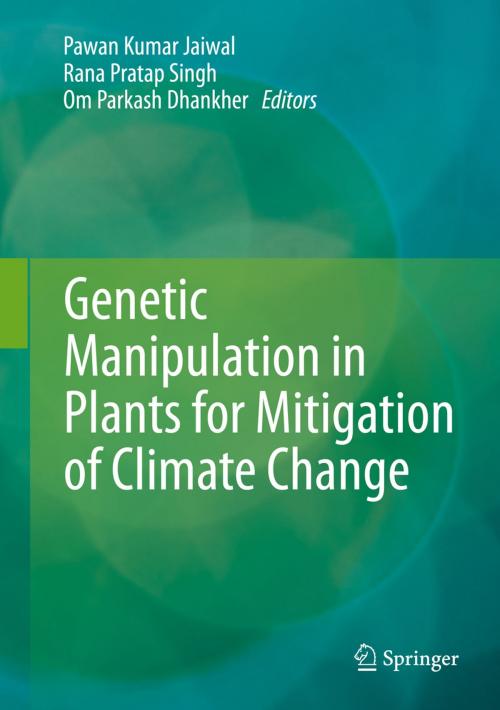Genetic Manipulation in Plants for Mitigation of Climate Change
Nonfiction, Science & Nature, Technology, Environmental, Agriculture & Animal Husbandry| Author: | ISBN: | 9788132226628 | |
| Publisher: | Springer India | Publication: | January 7, 2016 |
| Imprint: | Springer | Language: | English |
| Author: | |
| ISBN: | 9788132226628 |
| Publisher: | Springer India |
| Publication: | January 7, 2016 |
| Imprint: | Springer |
| Language: | English |
This book presents a detailed overview and critical evaluation of the state of the art and latest approaches in genetic manipulation studies on plants to mitigate the impact of climate change on growth and productivity. Each chapter has been written by experts in plant-stress biology and highlights the involvement of a variety of genes/pathways and their regulation in abiotic stress, recent advances in molecular breeding (identification of tightly liked markers, QTLs/genes), transgenesis (introduction of exogenous genes or changing the expression of endogenous stress- responsive genes) and genomics approaches that have made it easier to identify and isolate several key genes involved in abiotic stress such as drought, water lodging/flooding, extreme temperatures, salinity and heavy-metal toxicity.
Food and nutritional security has emerged as a major global challenge due to expanding populations, and cultivated areas becoming less productive as a result of extreme climatic changes adversely affecting the quantity and quality of plants. Hence, there is an urgent need to develop crop varieties resilient to abiotic stress to ensure food security and combat increased input costs, low yields and the marginalization of land.
The role of GM crops in poverty alleviation, nutrition and health in developing countries and their feasibility in times of climate change are also discussed. Recent advances in gene technologies have shown t
he potential for faster, more targeted crop improvements by transferring genes across the sexual barriers. The book is a valuable resource for scientists, researchers, students, planners and industrialists working in the area of biotechnology, plant agriculture, agronomy, horticulture, plant physiology, molecular biology, plant sciences and environmental sciences.
This book presents a detailed overview and critical evaluation of the state of the art and latest approaches in genetic manipulation studies on plants to mitigate the impact of climate change on growth and productivity. Each chapter has been written by experts in plant-stress biology and highlights the involvement of a variety of genes/pathways and their regulation in abiotic stress, recent advances in molecular breeding (identification of tightly liked markers, QTLs/genes), transgenesis (introduction of exogenous genes or changing the expression of endogenous stress- responsive genes) and genomics approaches that have made it easier to identify and isolate several key genes involved in abiotic stress such as drought, water lodging/flooding, extreme temperatures, salinity and heavy-metal toxicity.
Food and nutritional security has emerged as a major global challenge due to expanding populations, and cultivated areas becoming less productive as a result of extreme climatic changes adversely affecting the quantity and quality of plants. Hence, there is an urgent need to develop crop varieties resilient to abiotic stress to ensure food security and combat increased input costs, low yields and the marginalization of land.
The role of GM crops in poverty alleviation, nutrition and health in developing countries and their feasibility in times of climate change are also discussed. Recent advances in gene technologies have shown t
he potential for faster, more targeted crop improvements by transferring genes across the sexual barriers. The book is a valuable resource for scientists, researchers, students, planners and industrialists working in the area of biotechnology, plant agriculture, agronomy, horticulture, plant physiology, molecular biology, plant sciences and environmental sciences.















